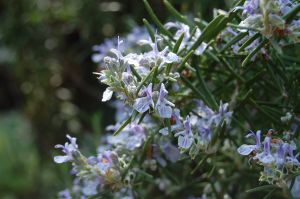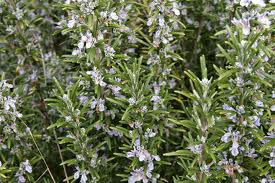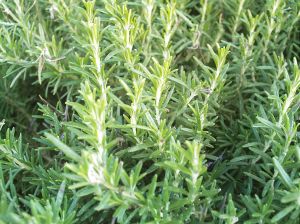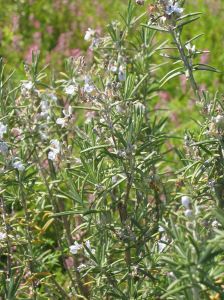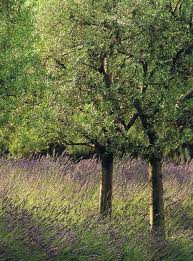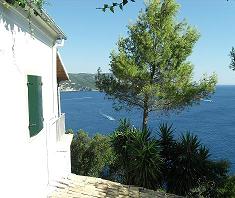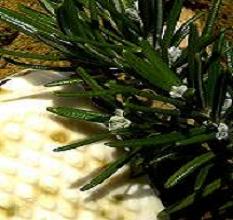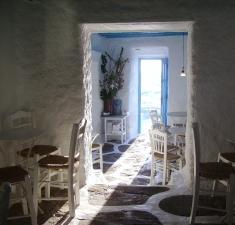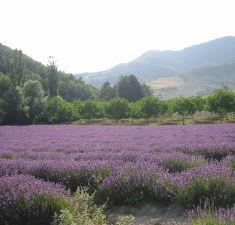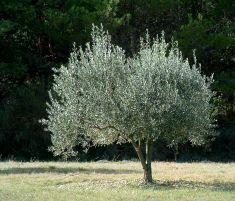Interesting Facts about Rosemary Essential oil.
An Introduction - Ancient and Traditional uses around the world.
Rosemary Essential Oil
Originally from Asia and the Mediterranean.The name Rosemary is derived from the Latin name Rosmarinus meaning "dew" (ros) of the "sea" (marinus) probably because of its capability to survive on only the humidity carried by the sea breezes in hot countries.
Legend has it that Aphrodite, the Greek goddess of love, arose from the sea with rosemary flowers adorning her body. The plant is sometimes referred to as Anthos, meaning flower in Greek.
This wonderful aromatic herb has been used since the beginning of civilisation, documented in ancient scriptures and tombs, in both Ancient Greece and Egypt the plant was considered sacred and used extensively, notably for safe passage from the living to the afterlife.
Remnants of the rosemary herb have been discovered in Egyptian tombs of the First Dynasty - giving comfort and peace to the dead, driving away evil spirits by placing it at the feet of the gods.
In Ancient Greece rosemary was also used to honour the gods, burnt at their shrines but also used widely in cooking, preserving food and medicinally for overcoming liver and spleen disorders and to invigorate the mind.
The Moors have always planted this woody herb in their orchards to repel pests.The Romans too, regarded rosemary as a sacred herb and used it to guard against cholera. Horace composed odes to it stating its properties as magical ! Rosemary was used at weddings and funerals, symbolizing love and death, loyalty and remembrance. It was given as a wedding gift, at funerals, mourners would throw the aromatic foliage into the graves of the deceased.
During the Middle Ages, it was used in every household wether it be to preserve meats ( if any were available ) or to purify the house against plague by burning it in the place of incense.Rosemary branches were strewn liberally upon floors to release its antiseptic properties when it was walked upon, it was carried in posies to fend off infectious illnesses and plague. Rosemary remained integral to weddings too, both bride and groom would wear sprigs of its flowers upon their clothes during the wedding ceremony and rosemary bushes would be planted outside the house, near to the front door, if the bushes grew very large it was said the woman ruled the household !
An alternative French name for the rosemary herb is incensier, relating back to medieval times when real incense was not available and the herb was burned in its place.
Queen Isabella of Hungary reputedly used it as a rejuvenating agent in her latter years with remarkable effect, she combined rosemary essential oil with brandy to make, what became known as "Hungary Water", an eau de cologne which she used on her face and body. Hungary Water became widely used throughout Europe....for centuries ! The basic recipe became modified and enhanced over time combining the rosemary essential oil with lavender, sage, mint, thyme, marjoram, orange blossom and lemon, it became a valuble remedy - not just for washing with or wearing as cologne but also it was imbibed too, as vodka and wine were added to the mix !
Shakespeare writes of its use when he uses it in Hamlet as tragic Ophelia utters "there's rosemary, that's for remembrance ". Culpepper in 1683 waxes lyrical about its properties describing it as a cure-all remedy, in the Pharmacopoeia Londinensis.
Great swathes of the herb were routinely used for fumigation purposes in French hospitals during epidemics until after the First World War.
In Australia and New Zealand, it is worn on Anzac Day as a mark of respect and remembrance to the fallen.
Throughout history it has been recognised for its properties to aid mental stimulation, to relieve pain and liver congestion, to reduce inflammation and help with scalp disorders. Nowadays rosemary essential oil continues to be used within the beauty and perfume industry and rosemary is an integral part of our cooking habits especially in food that we eat outdoors.
Rosemary essential oil is used in aromatherapy as an analgesic, antimicrobial, anti-oxidant, antirheumatic, antiseptic, antispasmodic, aphrodisiac, astringent, carminative, cephalic, cholagogue, choleretic, cicatrisant, cordial, cytophylactic, diaphoretic, digestive, diuretic, emmanagogue, fungicidal, hepatic, hypertensive, nervine, parasticide, restorative, rubefacient,
stimulant (circulatory, adrenal cortex, hepatobiliary), stomachic, sudorific, tonic and vulnerary.
Descriptions of the plant, its family and source
Rosemary.
Latin name - Rosmarinus Officinalis.
Family name - Labiatae.
Rosmarinus Officinalis is the most common of the cultivars of rosmarinus. It is also known as the "Rose of Mary", pertaining to the myth of the Virgin Mary turning the white flowers blue after she had lain upon the fragrant herb. Other names are Incensier or Anthos.
A dense evergreen woody shrub. 1.5 metres high. Needle-like leaves. Flowers, pink, white, purple or deep blue.
Native around the Mediterranean - now cultivated worldwide.
Principal constituents and method of extraction
Borneol, camphene, camphors, lineol, limonene, cineol, pinene and saponin.
Steam distillation of flowering tops, the leaves can also be used although this results in a poorer quality of oil. The oil is a pale yellow-green colour with a camphory incense like smell.
Click on the links below to discover more -
Follow the links below to discover how to use rosemary essential oils in your home, for beauty and health,
for cooking, for cleaning, in soapmaking and also how to grow rosemary. This wonderful herb
deserves a place in everyones home. Why not go to the Make Soap page, see the link below to try some more easy Olive Oil
based soap recipes.
Go to Introduction to the uses of Rosemary - Uses of rosemary and its oil.
Go to Rosemary Essential oil Soap - to find out how to make soap !
Go to Make Soap page for lots of wonderful soap recipes.
Go to Anayennisi Aromatics Mediterranean Diet Foods Recipe Page
Go to The Sitemap Page
Go to Anayennisi-Aromatics Home - from Rosemary Essential Oil





